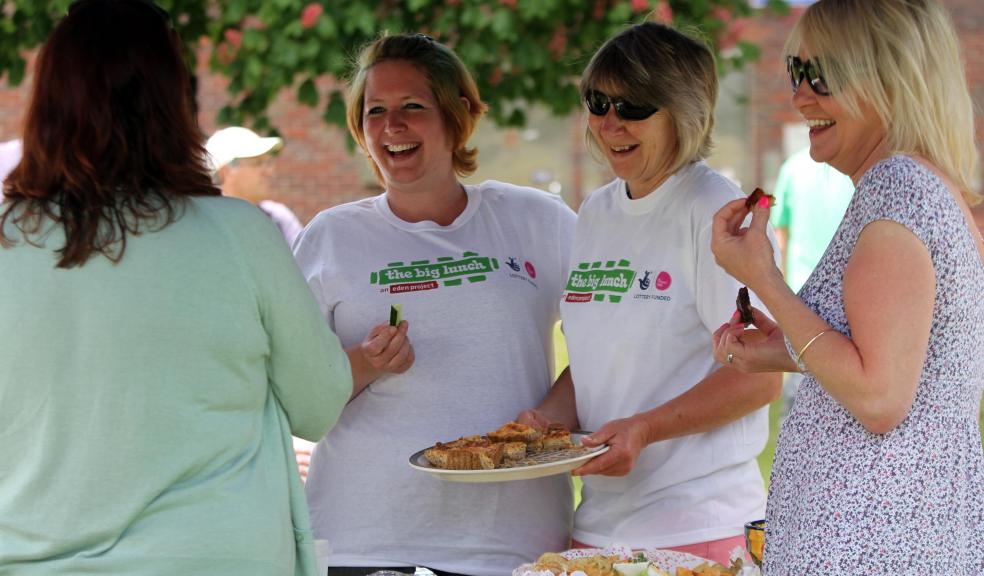
The Chattiest Streets in the South West are the Happiest Streets
Making small talk with a neighbour doesn’t always come naturally for people in the South West but when they do make the effort they feel happier, a new study has revealed.
A national survey carried out by Lottery-funded initiative The Big Lunch, the UK’s annual get-together for neighbours, found that more than 70% of people in the South West said that small talk makes them feel happier, despite it not coming naturally for 40% of those who responded.
Nearly 60% of people in the South West do make small talk with their neighbours on a regular basis and more than 50% in the region even go out of their way to start a conversation with a neighbour. More than 70% of those who do make small talk claim that a simple conversation with a neighbour makes them feel more in touch with the rest of their community.
Small talk comes more easily to the older generation, with 72% of over 55s saying it comes naturally compared to just 35% of under 35s. Twenty per cent of under 25s say that they do not talk at all with their neighbours.
The study found that although not everyone feels comfortable making small talk with their neighbours, 23% say they are flattered by the interest when a neighbour makes the effort to talk to them with 36% saying it makes them feel that they matter and are less invisible.
Commenting on the findings, Clinical Psychologist Tanya Byron said:
“It is very easy to trivialise 'small talk' as tedious and time wasting, but in fact taking the time to have meaningful but minimal interactions is very important. These are the conversations that have meaning and benefit our immediate community and wider society. They are free, take no time and are impactful."
“These moments are humanising and are an important acknowledgement of the individual. In taking the trouble to talk to your neighbour you may also be helping to reduce their sense of loneliness.”
When it comes to the motivation behind small talk, 40% of respondents said they wanted to enquire about someone’s wellbeing, while only 12% used small talk as a means to an end - for example asking their neighbour for a favour.
Researchers found that in the South West, the weather is the most popular subject when starting a conversation, followed by holidays and local events taking place in the community. Children, enquiring about a person’s wellbeing, or the opportunity to gossip are also among the popular themes when making small talk.
Top ten small talk subjects
1. Weather
2. Holidays
3. Local events happening in the community
4. Enquiring about well-being
5. Your/their children
6. Gossip or news about another neighbour
7. Work
8. National news/current affairs
9. Traffic
10. The current view
The garden provides the top location for small talk occasions, whether hanging out the washing, washing the car or other outdoor chores. Bumping in to neighbours in the local shops or pub also provides small talk meeting points.
Sir Tim Smit KBE, Founding Director, Eden Project and co-Founder The Big Lunch, which commissioned the research, said:
"The significance of small talk shouldn’t be underestimated. It might seem trivial but it can have a powerful impact on people. Small talk might not always come easily and can be awkward to initiate, but taking the time to start conversation can lead to big things."
“Small talk is in fact ‘big talk’ - it’s the code or tool which enables us to overcome our shyness. This is where The Big Lunch comes in – it’s the ice-breaker that is needed to convert strangers into possible friends or acquaintances. Feedback from previous years has shown that almost everyone who takes part in a Big Lunch feels closer to their neighbours as a result with two thirds going on to hold other events in their community afterwards proving it is not just about one day it’s about what happens before and after the event.”
The small talk that happens in communities is a lifeline for many and The Big Lunch is calling on everyone in the UK to boost the conversations happening in streets and gardens nationwide. Chatty neighbours in the South West are being encouraged to host a Big Lunch event in their communities on Sunday 1 June to spread small talk further and build community bonds. Anyone interested in organising a Big Lunch in their area is invited to request a free Big Lunch pack from www.thebiglunch.com to get their events off the ground.
Small talk provides a lifeline for some
With more and more of us living alone, an increase in communication via e-mail and text and feelings of loneliness on the rise, the study found that the simple act of talking to your neighbour is seen by those questioned as not only a way to ‘brighten someone’s day’ (40%) but as a ‘lifeline’ for those who live alone (35%). Sir Tim Smit added:
"Many of us take it for granted that we have jobs, friends and families – all of which act as opportunities for social interaction. Not everyone is as fortunate. Spare a thought for the elderly, infirm, those who are unemployed – for many, their only chance to talk to someone will be with their neighbours.”
Love thy neighbour
The Big Lunch research highlights that there is more to be done when it comes to making small talk with our neighbours as 46% admit they have got at least one neighbour they have never said ‘hello’ or ‘good morning’ to. 6% say they have never engaged in small talk with a neighbour, while another 4% admits it’s been years.
The key reasons holding people back from talking to their neighbours in the South West include not knowing what to say (24%), shyness (20%), or a lack of time (20%).
Researchers found, of those questioned in the South West, 42% claimed they wish they had a better relationship with the people living around them, while one in ten say they are firm friends with the person living next door. Sir Tim Smit concluded:
“At one end of the spectrum, making connections with our neighbours can help alleviate loneliness and social isolation and create happier and safer communities. But it can also have practical implications such as having someone you trust to feed your pets or collect your post when you are away from home.’’
The Big Lunch – made possible by the Big Lottery Fund - is expecting millions of people to take part on Sunday 1 June 2014. For more information about holding a Big Lunch, request a free pack online at www.thebiglunch.com. Packs contain invitations and posters to adapt for your community, as well as seeds, a bunting template and an inspiration booklet with lots of ideas and info to help get you started.













